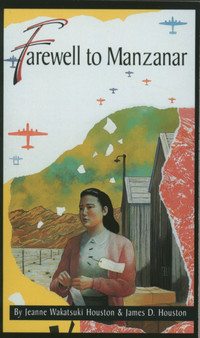Farewell to Manzanar

1983 edition
|
|
| Author | Jeanne Wakatsuki Houston, James D. Houston |
|---|---|
| Country | United States |
| Language | English |
| Subject | Japanese American internment |
| Genre | Non-fiction |
| Publisher | Houghton Mifflin |
|
Publication date
|
1973 |
| Media type | Print (Hardback & Paperback) |
| Pages | 177 |
| ISBN | |
| OCLC | 673358 |
Farewell to Manzanar is a memoir published in 1973 by Jeanne Wakatsuki Houston and James D. Houston. The book describes the experiences of Jeanne Wakatsuki and her family before, during and following their imprisonment at the Manzanar concentration camp due to the United States government's internment of Japanese Americans during World War II. It was adapted into a made-for-TV movie in 1976 starring Yuki Shimoda, Nobu McCarthy, James Saito, Pat Morita and Mako.
Jeanne Wakatsuki (the book's narrator) is a Nisei (child of a Japanese immigrant). At age seven, Wakatsuki—a native-born American citizen—and her family were living on Terminal Island (near San Pedro, California). Her father, a fisherman who owned two boats, was arrested by the FBI following the Pearl Harbor attack on December 7, 1941.
Soon after, she and the rest of her family were imprisoned at Manzanar (an American internment camp), where 11,070 Americans of Japanese ancestry and their immigrant parents—who were prevented from becoming American citizens by law—were confined during the Japanese American internment during World War II. The book describes the Wakatsukis' experiences during their imprisonment and events concerning the family before and after the war.
Ko Wakatsuki (Jeanne's father) emigrated from Japan to Honolulu, Hawaii and then to Idaho, running away with his wife and abandoning his family. Stubborn and proud, he did not cope well with his isolation: he drank, and abused his family. Woody (Jeanne's brother) wants to preserve his family's honor by joining the U.S. Army. After joining (and fighting in the Pacific theater) he visits his father's Aunt Toyo, who gave his father money for the trip to Hawaii. After the visit, Woody feels a new pride in his ancestry. He becomes the man of the family, leading them early in their internment.
...
Wikipedia
